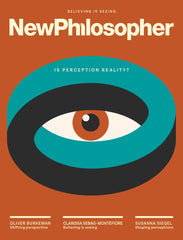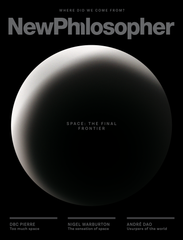Five Things I learnt from New Philosopher #32

As I get older, I fear that, rather like a favourite pair of knickers, my brain is losing its elastic. In days of yore, it felt sharp and snappy but these days, the thought of finding myself in a healthy debate on the Big Topics breaks me out in a sweat.
Of course, it might not be age, it’s more likely an over-indulgence of Netflix over books, and comedy podcasts over the news. But, it’s never too late to start working out the old grey matter again.
My recent antidote for cerebral entropy is New Philosopher magazine. It is a mix of science and philosophy from some of the best minds past and present, talking about fundamental issues facing humankind, like perception, space, purpose and power. It’s beautifully put together, challenging at times but seriously interesting and highly enjoyable. I find myself copying out interesting quotes, making notes on my phone or even, ahem, writing in the margins.
I read the latest New Philosopher issue about Energy from cover to cover (in a few sittings - it’s a meaty read) and here’s five things I learnt…

1. Humans have worse concentration than a goldfish.
According to a 2015 Microsoft study, a goldfish can concentrate for 9 seconds, while we can only focus for 8 (and yes, this is a whole 4 seconds less than our pre-internet brains). This terrifying fact is part of piece by Clarissa Sebag-Montefiore on living in the age of distraction. I know I live in the age of distraction but I can never concentrate long enough to um, ...
2. I dig a bit of Kierkegaard
Up until reading this issue, I had only heard of Kierkegaard from watching The Good Place (the brilliant Netflix show on the nature of good and bad and the afterlife). But! I can now say that I have read and understood (four sentences of) his work. Called the Father of Existentialism (thank you, Google) he summed up the end of humanity thus,
“A fire broke out backstage in a theatre. The clown came out to warn the public; they thought it was a joke and applauded. He repeated it; the acclaim was even greater. I think that’s just how the world will come to an end: to the general applause of wits who believe it’s a joke.”
Brilliantly put as well as being rather horrifying.
3. The brain is only 2% of your body weight but uses 20% of your energy.
Ok, not as thought-provoking as my pal, Kierkergaard, but a pretty good did-you-know/pub quiz fact right there. You can find more interesting energy trivia on page 33 of the issue.
4. Perpetual motion machines are a thing

I mean they don’t actually work (down to a pesky thing called entropy, which I alsolearnt about in this issue) but Patrick Stokes writes a brilliant piece about a carnival barker turned inventor who almost fooled the world into believing he had created a machine that needed no external energy source.
Full of wonderful old-timey scientific expressions like ‘etheric vapour’ and ‘vibratory sympathy,’ it’s a great read which folds in Leonardo da Vinci, Tom Stoppard and the second law of thermodynamics.
5. We are not ready for Utopia

Tim Dean’s essay was a real rollercoaster of emotion, taking you from dizzy heights of optimism as he outlines the utopia that is possible with the limitless energy of fusion power (‘with enough energy, recycling becomes cheaper than mining…with enough energy, there’s no shortage of clean water’) before plunging you into despair as he outlines the very real reasons why this utopia can never be.
“Every major decision we make is based on the assumption that there’s not enough stuff to go around.” Where we do have zero or marginal cost goods, he says, we can’t help ourselves but artificially impose scarcity (think intellectual property laws). It’s a bit depressing, granted, but whether you agree with him or not, it’s a fascinating question and a prime example of New Philosopher seriously tickling your thinking cap.
New Philosopher Issue 32 is available here. £9.95. All images taken from this issue.

Energy is just one topic covered by New Philosopher. Check out all our New Philosopher issues here.
Love New Philosopher? Check out their fantastic sister publication, Womankind.







Leave a comment (all fields required)